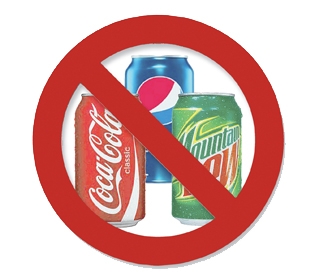Soda. Pop. Soda-pop. Soft drink. Cola. Whatever you call it, sweet, carbonated beverages are a big part of American life. And, when consumed on a very limited basis, the occasional sugary soda probably won’t hurt you unless you’re dealing with certain health conditions like diabetes or obesity.
But what if you drink sugary sodas on the reg? Are they bad for you? And how about drinking soda before you go to the gym? Will it affect your performance?
Research shows that drinking too much sugary soda is unhealthy for a variety of reasons, and in the vast majority of cases, drinking soda before a workout can hinder your athletic performance.
At Adventure Fitness Athletic Club, we generally advise members of our Thornton gym to drink water or a sports drink with electrolytes before and after working out. Any other option like sodas, energy drinks, and fancy coffee concoctions will likely work against you and your fitness goals.
In this blog, we’ll explore why sugary sodas are not the best hydration option when you’re trying to work out and stay healthy.
Why is it bad to drink sugary sodas before, during, or after my gym workout?
Many athletes are looking for ways to boost their energy before, during, and after a workout at their local gym. And in some ways, guzzling a bottle of soda makes sense — a good dose of sugar and caffeine seems like it would give us the jolt of energy we need when exercising.
However, any sugar and caffeine high we get from soda is short-lived at best, and comes with a long list of potential downsides.
Most sodas contain sugar
Unless it’s carbonated water or diet soda, regular soda has sugar (or its close cousin, high fructose corn syrup), and lots of it. Every 12-ounce can of regular cola has the equivalent of 10 teaspoons of sugar. While sugar can give your body a short-term energy boost, once it’s depleted, you’ll get what’s known as a “sugar crash” because your body is not designed to switch to other energy sources like fats and protein quickly. This can significantly hamper athletic performance.
A 12-ounce can of regular soda also has about 150 calories. That means drinking just one can per day could cause you to gain 15 pounds of fat in a year, which will almost certainly hinder you from achieving your fitness goals.
Other risks of consuming too much sugar include:
- Lower levels of energy and alertness
- Increased rates of depression
- Tooth decay (sugary soda is especially bad for teeth because the carbonation can wear away tooth enamel, and oral bacteria converts sugar into acid that also erodes tooth enamel)
- High blood pressure
- Cardiovascular disease
- Aging skin
- Insulin resistance and diabetes
- Increased risk of cancer
Most sodas contain caffeine
While caffeine can help sustain exercise performance at the gym in small to moderate doses (75-200 mg) without affecting hydration, any more than that can cause you to become dehydrated because caffeine is a diuretic. As dehydration increases, you could experience a decrease in physical and mental performance.
Studies show that losing just 2% of your body mass in fluid can cause a measurable decrease in performance. That’s partly because your body needs adequate fluids to carry nutrients to your muscles and remove waste that’s produced when you exercise.
Losing more than 2% of your body weight in fluid during athletic activity can cause nausea, vomiting, weakness, muscle cramps, and tissue breakdown. This is especially true when you exercise in hot and humid conditions. And, contrary to popular belief, it is impossible to “train” your body to perform better while dehydrated.
Sodas contain phosphoric acid
Phosphoric acid is an odorless, colorless liquid that gives sodas a tangy flavor. Phosphoric acid also prevents the growth of bacteria and mold in soda.
Phosphoric acid is made from phosphorus, which is a mineral that’s naturally found in the body. Phosphorus actually offers multiple benefits to the body, for example:
- It works with calcium to help you form strong teeth and bones.
- It helps your muscles recover after a hard workout
- It helps support your kidney function.
- It supports the way your body uses and stores energy
- It’s needed by your body to produce DNA and RNA
While it’s clear that you need phosphorus, too much of it can cause an imbalance that decreases the amount of calcium in your body, which puts you at risk for bone loss, osteoporosis, and heart disease. This can be exaggerated by the fact that drinking too much soda can mean that you’re not drinking healthier beverages like milk that can support your bones. Excessive phosphorus can also hurt your body’s ability to use other important minerals like iron, magnesium, and zinc.
Is it ever good to drink a sugary soda before or after exercise at the gym?
The short answer to this question is, probably not. However, some studies have found that drinking a sugary drink like soda can be helpful for intense endurance athletes like a cyclist or runner during hours-long marathons because it gives them a store of energy that they’ll need during the event. This benefit does not appear to carry over to the average person at the gym lifting weights or doing cardio on a treadmill or elliptical machine, however.
What about diet sodas and other sugar-free carbonated beverages?
Of course, sugary sodas only make up a portion of carbonated beverages that are available on the market.
The basic definition of a carbonated beverage is one that contains carbon dioxide which gives the drink its fizzy, bubbly consistency. In addition to soft drinks and some energy drinks, many other beverages are carbonated including seltzers, sparkling waters, and diet sodas.
Seltzers and sparkling water generally have no added sugars, syrups, caffeine, or phosphoric acid. Studies have shown that these beverages hydrate people just as well as regular water and don’t carry any of the negative health effects that regular sodas do. That means it’s harmless to drink sparkling water and seltzers when you’re exercising, although it might not feel like it’s quenching your thirst as much.
Diet soda is better than regular soda in many ways because it doesn’t contain sugar or high fructose corn syrup. However, many diet sodas do contain caffeine, phosphoric acid, and artificial sweeteners, so it’s important to look at the label to see what’s in the diet soda you’re drinking and consider how it many affect your health. You might even want to consult your healthcare provider if you have further questions.
That said, when you’re exercising, most fitness experts agree that it’s much better to hydrate with water or even a sports drink than diet soda, and save diet soda as an occasional beverage you consume with a meal.
Stay Hydrated When You Exercise at Our Thornton Gym
You might be surprised to learn that studies have shown milk and an oral rehydration solution provided the highest amount of hydration when compared to other beverages. Sports drinks, orange juice, soda, diet soda, sparkling water, hot tea, iced tea, coffee, and lager all provided the same hydration levels as water. Even so, the other ingredients and higher calorie content in non-water beverages make them less-than-ideal for consuming after exercise.
The team at Adventure Fitness Athletic Club is here to assist you with any questions you have about our gym and staying hydrated as you work out with our fitness classes, equipment, and personal trainers. You can also contact our gym owner, Susan at 720-849-0245 or susan@adventurefitness.club for assistance. Our goal is to be the best gym in the greater Thornton, Colorado, area!
To read more articles from Adventure Fitness Athletic Club, check out our Adventure Corner blogs by clicking here.




